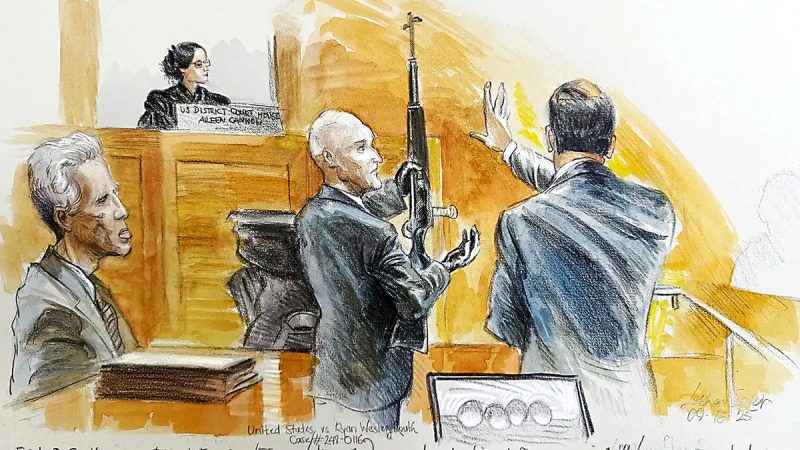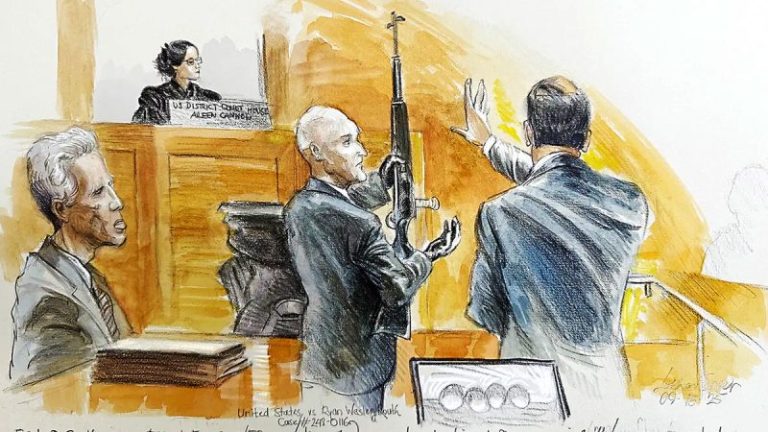
Ryan Routh, the man accused of attempting to assassinate then-presidential candidate Donald Trump at his Florida golf course last year, said he would not take the stand in his own criminal case on Monday — the strongest sign yet that the defense is preparing to rest its case and kick the trial into its final phase before jury deliberation.
Routh, 59, has been representing himself in the federal criminal trial. He has pleaded not guilty to charges of attempting to assassinate a major presidential candidate, assaulting a federal officer, and possession of a firearm, among other crimes. If convicted, he could face life in prison.
He previously floated the possibility that he could testify on his own behalf — a risky strategy that would have waived his Fifth Amendment protections against self-incrimination, and opened him up to cross-examination by federal prosecutors.
Judge Aileen Cannon pressed Routh repeatedly Monday morning on whether he’d had enough time to consider his decision or wanted to consult standby counsel. He said he was sure. Prosecutors then asked for the lunch hour to decide if they would call rebuttal witnesses.
If none are called, the defense is expected to rest within hours, clearing the way for closing arguments and jury deliberations.
Routh opened his defense Monday with Michael McClay, a gun specialist and his only expert witness, followed by testimony from a family friend and a former colleague.
McClay, an expert in sniper firearms and tactics with an extensive career in military and law enforcement, confirmed at the outset of Routh’s questioning that he was subpoenaed to testify, and did not want to appear on Routh’s behalf.
Routh spent most of the time questioning McClay about the operability scope of the rifle in question, including trying to cast doubt on the likelihood that the SKS rifle in question could not hit a target 375 yards away.
McClay, in response, said it depended on the skill of the shooter — but confirmed that the rifle was capable of hitting a target from that distance.
During cross-examination, the prosecution asked McClay about the likelihood of the rifle inflicting damage on a person if it was shot at that distance and hit an intended target. McClay said yes, the person would be hurt. Routh asked in McClay’s view whether he believed that a cowardly sniper would have an exit strategy if their plan failed, to which McClay said, ‘in all his missions, there was some way to escape.’
Routh’s witness list was sparse compared to the dozens of witnesses introduced by prosecutors, including forensics experts, FBI agents, and Secret Service agents over the course of a two-week period.
By contrast, Routh’s list included McClay, family friend Atwill Milsun, and a former colleague, Marshall Hinshaw.
The other witnesses spoke briefly and did not present much in the way of new or relevant information, as was expected, given their personal ties to the defendant.
Routh was also not expected to present any evidence on his own behalf.
His earlier submissions to the court were deemed to be inadmissible. Prosecutors said the exhibits include books that were authored by Routh, handwritten drawings, and Eagle Scout awards from his childhood.
Last week, Cannon said that she would keep the exhibits on the docket and would give Routh the ability to challenge the court’s ruling, should he choose to do so.
Routh’s attempt to defend himself in his own criminal trial, using scant evidence and a thin list of witnesses, starkly contrasts with the prosecution, which spent nearly two weeks carefully and extemporaneously making its case against Routh to a jury in Fort Pierce, Florida.
In that span, jurors heard from 38 witnesses and reviewed hundreds of exhibits — text messages, call logs, bank records, and cellphone data — linking Routh to the alleged gun purchase and placing him near Trump International Golf Club in West Palm Beach in the weeks before the attempted assassination.
Prosecutors also presented extensive digital and forensic evidence. FBI officials testified last week that Routh’s DNA was found on the rifle scope grip, a glove, a bungee cord, and a bag recovered from the ‘sniper’s nest’ near the sixth hole, where he allegedly waited at least 12 hours for the president’s arrival.
Before resting its case Friday, the government’s final witness, FBI Supervisory Special Agent Kimberly McGreevy, walked the jury through extensive cellphone data, license plate records, surveillance footage, and other information prosecutors alleged tied Routh to Trump’s movements in the weeks before the alleged attempt.

